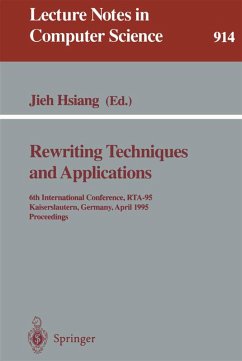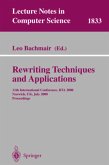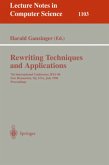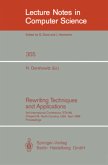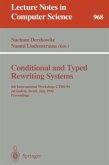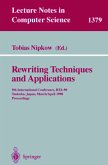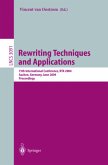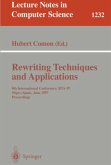Hsiang6th International Conference, RTA-95, Kaiserslautern, Germany, April 5 - 7, 1995. Proceedings
Rewriting Techniques and Applications
6th International Conference, RTA-95, Kaiserslautern, Germany, April 5 - 7, 1995. Proceedings
Mitarbeit:Hsiang, Jieh
Hsiang6th International Conference, RTA-95, Kaiserslautern, Germany, April 5 - 7, 1995. Proceedings
Rewriting Techniques and Applications
6th International Conference, RTA-95, Kaiserslautern, Germany, April 5 - 7, 1995. Proceedings
Mitarbeit:Hsiang, Jieh
- Broschiertes Buch
- Merkliste
- Auf die Merkliste
- Bewerten Bewerten
- Teilen
- Produkt teilen
- Produkterinnerung
- Produkterinnerung
This volume presents the proceedings of the Sixth International Conference on Rewriting Techniques and Applications, RTA-95, held in Kaiserslautern, Germany in April 1995. The 27 full revised papers were selected from a total of 87 submissions. In addition there are 9 system descriptions and two problem sets, one contributed by Mark E. Stickel and Hantao Zhang and another by Nachum Dershowitz, Jean-Pierre Jouannaud and Jan Willem Klop. The volume addresses all current aspects of rewriting techniques and their applications and thus defines the state-of-the-art in this active field of research.
Andere Kunden interessierten sich auch für
![Rewriting Techniques and Applications Rewriting Techniques and Applications]() Leo Bachmair (ed.)Rewriting Techniques and Applications39,99 €
Leo Bachmair (ed.)Rewriting Techniques and Applications39,99 €![Rewriting Techniques and Applications Rewriting Techniques and Applications]() GanzingerRewriting Techniques and Applications39,99 €
GanzingerRewriting Techniques and Applications39,99 €![Rewriting Techniques and Applications Rewriting Techniques and Applications]() Nachum Dershowitz (ed.)Rewriting Techniques and Applications39,99 €
Nachum Dershowitz (ed.)Rewriting Techniques and Applications39,99 €![Conditional and Typed Rewriting Systems Conditional and Typed Rewriting Systems]() DershowitzConditional and Typed Rewriting Systems39,99 €
DershowitzConditional and Typed Rewriting Systems39,99 €![Rewriting Techniques and Applications Rewriting Techniques and Applications]() NipkowRewriting Techniques and Applications39,99 €
NipkowRewriting Techniques and Applications39,99 €![Rewriting Techniques and Applications Rewriting Techniques and Applications]() Vincent van Oostrom (ed.)Rewriting Techniques and Applications39,99 €
Vincent van Oostrom (ed.)Rewriting Techniques and Applications39,99 €![Rewriting Techniques and Applications Rewriting Techniques and Applications]() ComonRewriting Techniques and Applications39,99 €
ComonRewriting Techniques and Applications39,99 €-
-
-
This volume presents the proceedings of the Sixth International Conference on Rewriting Techniques and Applications, RTA-95, held in Kaiserslautern, Germany in April 1995.
The 27 full revised papers were selected from a total of 87 submissions. In addition there are 9 system descriptions and two problem sets, one contributed by Mark E. Stickel and Hantao Zhang and another by Nachum Dershowitz, Jean-Pierre Jouannaud and Jan Willem Klop.
The volume addresses all current aspects of rewriting techniques and their applications and thus defines the state-of-the-art in this active field of research.
The 27 full revised papers were selected from a total of 87 submissions. In addition there are 9 system descriptions and two problem sets, one contributed by Mark E. Stickel and Hantao Zhang and another by Nachum Dershowitz, Jean-Pierre Jouannaud and Jan Willem Klop.
The volume addresses all current aspects of rewriting techniques and their applications and thus defines the state-of-the-art in this active field of research.
Produktdetails
- Produktdetails
- Lecture Notes in Computer Science 914
- Verlag: Springer / Springer Berlin Heidelberg / Springer, Berlin
- Artikelnr. des Verlages: 978-3-540-59200-6
- 1995.
- Seitenzahl: 492
- Erscheinungstermin: 22. März 1995
- Englisch
- Abmessung: 235mm x 155mm x 27mm
- Gewicht: 654g
- ISBN-13: 9783540592006
- ISBN-10: 3540592008
- Artikelnr.: 09232124
- Herstellerkennzeichnung
- Springer-Verlag KG
- Sachsenplatz 4-6
- 1201 Wien, AT
- ProductSafety@springernature.com
- Lecture Notes in Computer Science 914
- Verlag: Springer / Springer Berlin Heidelberg / Springer, Berlin
- Artikelnr. des Verlages: 978-3-540-59200-6
- 1995.
- Seitenzahl: 492
- Erscheinungstermin: 22. März 1995
- Englisch
- Abmessung: 235mm x 155mm x 27mm
- Gewicht: 654g
- ISBN-13: 9783540592006
- ISBN-10: 3540592008
- Artikelnr.: 09232124
- Herstellerkennzeichnung
- Springer-Verlag KG
- Sachsenplatz 4-6
- 1201 Wien, AT
- ProductSafety@springernature.com
On some mathematical logic contributions to rewriting techniques: Lost heritage.- Modularity of completeness revisited.- Automatic termination proofs with transformation orderings.- A termination ordering for higher order rewrite systems.- A complete characterization of termination of 0p 1q?1r 0s.- On narrowing, refutation proofs and constraints.- Completion for multiple reduction orderings.- Towards an efficient construction of test sets for deciding ground reducibility.- Term rewriting in contemporary resolution theorem proving.- ??!?=1 Optimizing optimal ?-calculus implementations.- Substitution tree indexing.- Concurrent garbage collection for concurrent rewriting.- Lazy rewriting and eager machinery.- A rewrite mechanism for logic programs with negation.- Level-confluence of conditional rewrite systems with extra variables in right-hand sides.- A polynomial algorithm testing partial confluence of basic semi-Thue systems.- Problems in rewriting applied to categorical concepts by the example of a computational comonad.- Relating two categorical models of term rewriting.- Towards a domain theory for termination proofs.- Higher-order rewrite systems.- Infinitary lambda calculi and böhm models.- Proving the genericity lemma by leftmost reduction is simple.- (Head-)normalization of typeable rewrite systems.- Explicit substitutions with de bruijn's levels.- A restricted form of higher-order rewriting applied to an HDL semantics.- Rewrite systems for integer arithmetic.- General solution of systems of linear diophantine equations and inequations.- Combination of constraint solving techniques: An algebraic point of view.- Some independence results for equational unification.- Regular substitution sets: A means of controlling E-unification.- DISCOUNT: A system fordistributed equational deduction.- ASTRE: Towards a fully automated program transformation system.- Parallel ReDuX ? PaReDuX.- STORM: A many-to-one associative-commutative matcher.- LEMMA: A system for automated synthesis of recursive programs in equational theories.- Generating polynomial orderings for termination proofs.- Disguising recursively chained rewrite rules as equational theorems, as implemented in the prover EFTTP Mark 2.- Prototyping completion with constraints using computational systems.- Guiding term reduction through a neural network: Some preliminary results for the group theory.- Studying quasigroup identities by rewriting techniques: Problems and first results.- Problems in rewriting III.
On some mathematical logic contributions to rewriting techniques: Lost heritage.- Modularity of completeness revisited.- Automatic termination proofs with transformation orderings.- A termination ordering for higher order rewrite systems.- A complete characterization of termination of 0p 1q?1r 0s.- On narrowing, refutation proofs and constraints.- Completion for multiple reduction orderings.- Towards an efficient construction of test sets for deciding ground reducibility.- Term rewriting in contemporary resolution theorem proving.- ??!?=1 Optimizing optimal ?-calculus implementations.- Substitution tree indexing.- Concurrent garbage collection for concurrent rewriting.- Lazy rewriting and eager machinery.- A rewrite mechanism for logic programs with negation.- Level-confluence of conditional rewrite systems with extra variables in right-hand sides.- A polynomial algorithm testing partial confluence of basic semi-Thue systems.- Problems in rewriting applied to categorical concepts by the example of a computational comonad.- Relating two categorical models of term rewriting.- Towards a domain theory for termination proofs.- Higher-order rewrite systems.- Infinitary lambda calculi and böhm models.- Proving the genericity lemma by leftmost reduction is simple.- (Head-)normalization of typeable rewrite systems.- Explicit substitutions with de bruijn's levels.- A restricted form of higher-order rewriting applied to an HDL semantics.- Rewrite systems for integer arithmetic.- General solution of systems of linear diophantine equations and inequations.- Combination of constraint solving techniques: An algebraic point of view.- Some independence results for equational unification.- Regular substitution sets: A means of controlling E-unification.- DISCOUNT: A system fordistributed equational deduction.- ASTRE: Towards a fully automated program transformation system.- Parallel ReDuX ? PaReDuX.- STORM: A many-to-one associative-commutative matcher.- LEMMA: A system for automated synthesis of recursive programs in equational theories.- Generating polynomial orderings for termination proofs.- Disguising recursively chained rewrite rules as equational theorems, as implemented in the prover EFTTP Mark 2.- Prototyping completion with constraints using computational systems.- Guiding term reduction through a neural network: Some preliminary results for the group theory.- Studying quasigroup identities by rewriting techniques: Problems and first results.- Problems in rewriting III.

